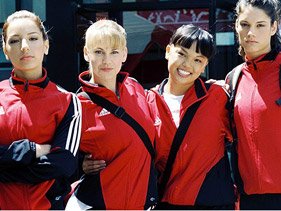Stick It Is a Beautiful Movie
 Bear with me. Stick It, and to a lesser extent The Break-Up, are two of the finest Hollywood products of the year. Color me unsurprised, because the two lovable tykes are related. Sort of. Their familial line goes back to that fizzy concoction Bring It On, which as we're all aware I watched drunk in a theater the night before I left for college. Good times. And yet did I miss out on better times by not settling for the natural high of its innocent charms? Possibly. At that time I dismissed such youthful pabulum with a scornful swig of High Life. No more. No matter. What is important here are the names, much abused, of Peyton Reed and Jessica Bendinger. Director and writer, respectively, of the cheerleading movie. They're doing nice things. Entertainments based on character and a modicum of wit. Rare things, both, which is perhaps why I may be accused of overpraising them. Go right ahead.
Bear with me. Stick It, and to a lesser extent The Break-Up, are two of the finest Hollywood products of the year. Color me unsurprised, because the two lovable tykes are related. Sort of. Their familial line goes back to that fizzy concoction Bring It On, which as we're all aware I watched drunk in a theater the night before I left for college. Good times. And yet did I miss out on better times by not settling for the natural high of its innocent charms? Possibly. At that time I dismissed such youthful pabulum with a scornful swig of High Life. No more. No matter. What is important here are the names, much abused, of Peyton Reed and Jessica Bendinger. Director and writer, respectively, of the cheerleading movie. They're doing nice things. Entertainments based on character and a modicum of wit. Rare things, both, which is perhaps why I may be accused of overpraising them. Go right ahead.After the 2000 success of Bring It On they went their merry ways - Peyton Reed with his generally ignored and rather delightful Hudson-Day thing Down With Love, while Bendinger has only done some script doctoring work, on 2004's First Daughter, Jonathan Demme's The Truth About Charlie, and this year's Aquamarine.
And now we're here. Stick It, released in late April, has only made around $25 Million, and was panned across the board, aside from the increasingly invaluable Nathan Lee. I think it largely has to do with the film's assumed genre, the teen starlet self-actualization flick, where Lohan/Duff overcome minor hurdles to get self-esteem and the guy. Critics have templates to pan these type of things, and understandably so, but sometimes quality falls through the cracks.
Consider Bendinger's take on her film, from an interview at Box Office Mojo before the film's release:
JB:" ...I was tired of movies that try to shoehorn romance. Girls need to have a life before they need to have a love life. You don't need a romance or a tiara or a makeover. She needed to have a sense of self first.... I try to build the person first and the concept second. Anytime you're starting with concept, you're f—-ed, because the cart's leading the horse. Unfortunately, the Hollywood model right now is that the concept comes first. That's the formula. Then you're trying to make characters come alive within that formula."
This is not a normal teen movie, even though it apes the structure and style of it. The plot is thus: pop-punk skater Hayley gets nabbed by the cops for inadvertantly vandalizing a housing development on a skate trick. To avoid jail time, she is sent back to her old gymnastics school (!), which she left after refusing to perform during the Olympics, losing her team the gold. So, her coach (Jeff Bridges), trains her to regain her old form, etc., and a national championship montage ensues. But the ending, remarkably, is not what you'd expect.
It is the basic story of self-actualization of the Lohan/Duff mold, except there is no romance, only a richly ambiguous friendship with two guys, and its definition of success is an inversion of the norm: it promotes radical individuality over accumulating social respectability. In the end, the medals mean nothing. After a series of insulting scores from the judges, there is a mass revolt, as each athlete intentionally scratches in flamboyant fashion until the teammate they believe deserves to win does her routine. These women, who are used by their coaches, their parents, the networks, the advertisers, and their fans - here assert their power in a principled, beautifully simple way. In withholding their talents, they regain control of themselves. Exposing a bra strap (which judges deduct for) becomes a revolutionary act.
So there's the template - but it's the nuances that make it sing. The colors pop and the performers echo the energy. Jeff Bridges (who is singled out in every review I read, negative or positive) is excellent as the disgraced coach who pops his collar while fueling mothers' fantasies about gold medals. He has a swagger that's turned sour (his strut is more like a stoop) by multiple failures, and Haley (Missy Peregrym) sees right through his worn out posturing. Missy injects enough smirk into her pout to make her disconsolate youth likable, and shows more than enough athleticism to make her lanky frame believable as a gymnast. The supporting characters are types, but ones that are enriched by the sympathy and conviction with which they're shaped. There's the stuck-up perfectionist Joanne, all sharp lines and up-turned nose, who melts at the chance to go to prom with one of Haley's friends. Since no genre trope goes unquestioned here, when they go shopping for dresses - her date tries them on as well. And then all did cartwheels in lacy primary color getups - I prayed for a musical to break out. No such luck, but there were some Berkely-esque bird's eye shots of geometric training in the gym.
The music that was selected was superb (Missy Elliot, Talib Kweli, Fannypack, Jurassic 5), and in a side note, the music video that accompanies the Elliot song (We Run This (edited clean from The Cookbook)) has Dominique Dawes and Elliot doing routines on the exposed beams of a gutted out building. Good shit. When even the promotional tie-ins are works of art, you know you have a winner.
This film had little or no advertising muscle behind it, and the poor box office was the result. I just hope Bendinger is able to make a few more projects on her own after this. Hopefully the DVD will sell well and recoup some costs - because for a talent like her to be toiling as the fifteenth writer on First Daughter is a near tragedy.
On to a film with a massive advertising budget
 and a gargantuan publicity campaign: The Break-Up. Saddled with far more expectations and the lifeless Jennifer Aniston, it's still a bracingly mature film about relationships with inventive touches sparkling at the edges of the narrative. It would be hard to call this a Peyton Reed film as clearly as Stick It is Bendinger's - it's far more Vince Vaughn's, who stars, co-produces, and who conceived the story. Thankfully Vaughn continues to be a ceaselessly entertaining performer, biting off deadpan riffs with relaxed charm. As the film unfolds these riffs increasingly become distancing techniques, an ironic jab easier than an emotional confession. Of course, the film pounds this idea home in an unnecessary monologue by Vaughn, who explicitly states this theme as if the audience were schoolchildren in English class. This is Hollywood, of course. But it least it had an idea - and it is followed through - his distancing tactic pushes her away, and during arguments that are refreshingly banal, and which build organically until bile is hacked up. Rather realistic, that.
and a gargantuan publicity campaign: The Break-Up. Saddled with far more expectations and the lifeless Jennifer Aniston, it's still a bracingly mature film about relationships with inventive touches sparkling at the edges of the narrative. It would be hard to call this a Peyton Reed film as clearly as Stick It is Bendinger's - it's far more Vince Vaughn's, who stars, co-produces, and who conceived the story. Thankfully Vaughn continues to be a ceaselessly entertaining performer, biting off deadpan riffs with relaxed charm. As the film unfolds these riffs increasingly become distancing techniques, an ironic jab easier than an emotional confession. Of course, the film pounds this idea home in an unnecessary monologue by Vaughn, who explicitly states this theme as if the audience were schoolchildren in English class. This is Hollywood, of course. But it least it had an idea - and it is followed through - his distancing tactic pushes her away, and during arguments that are refreshingly banal, and which build organically until bile is hacked up. Rather realistic, that.When Aniston is out of frame, there are some well observed moments - the Favreau-Vaughn patter is on-target juvenelia, while the Vaughn-D'onofrio bits are rich scenes of displaced love. They're brothers. In one wonderful sequence, D'onofrio takes forever to clean out his ears with his handkerchief as he pesters Vaughn to hand in his books (they're in business together). This is after the break-up - and Vaughn wants sympathy. His depression, their mutual distance, and the physical comedy add up to a scene of clashing energy. The film also displays fine taste by shipping Aniston off to see the Old 97s in concert. She gets stood up. Rhett Miller would understand.
I heard lots of rumor and heresay about how the ending of the film was reshot after a poor test screening in order to insert a happy ending. Thankfully, that's bullshit, and the ending is tastefully ambiguous, with Vaughn plastering on an awkward smile after meeting her on the street. So awkward, in fact, that it torpedoes any notion that they're going to get back together. He's forcing it, and wants to get the hell out of there. But it leaves just enough to the romantics to leave with a sliver of hope. A nice way to navigate the demands of the market, I think, which is a nice way to think of the film as a whole - a thoroughly compromised work that found intelligent ways out of imposed restrictions.

0 Comments:
Post a Comment
<< Home